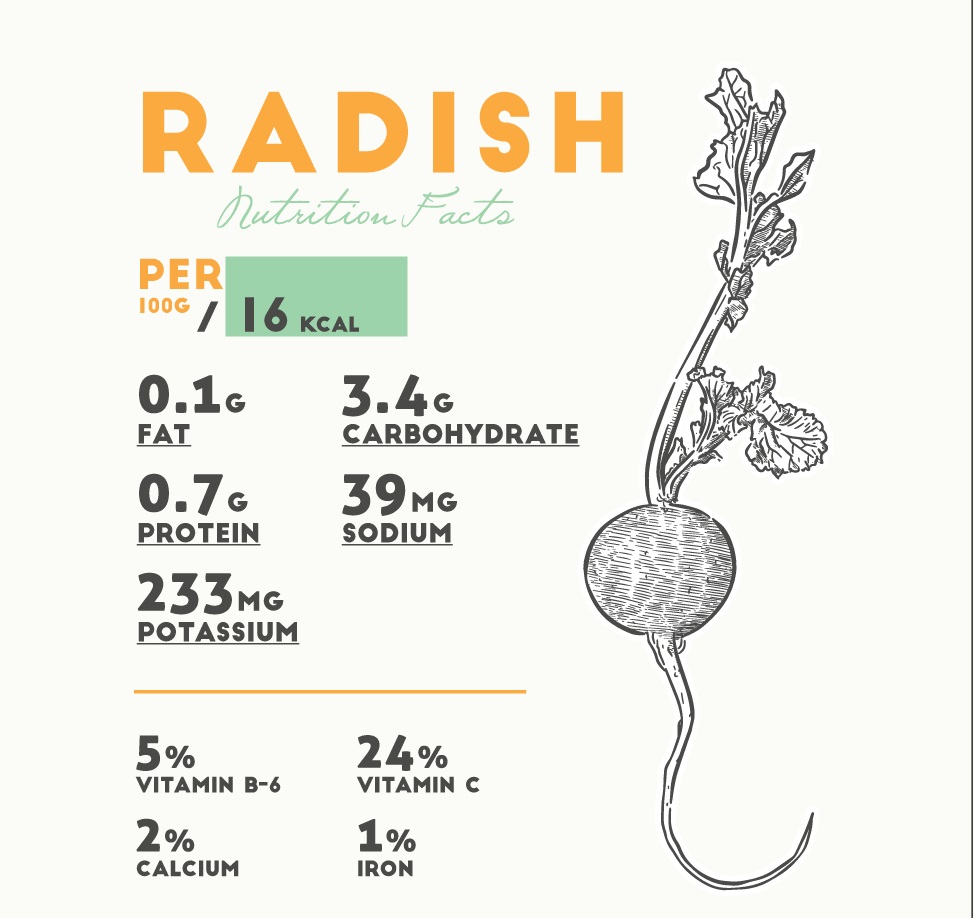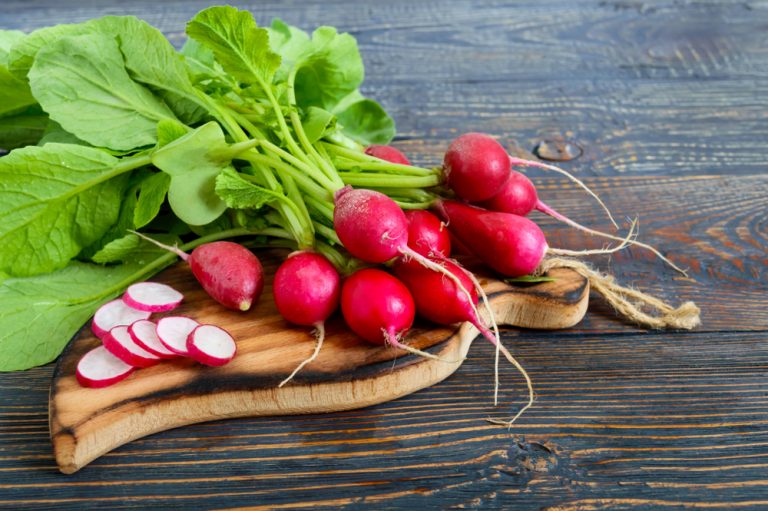Radish (Raphanus sativus L.) is a very popular plant. The season for radishes lasts from spring to autumn most commonly. The plant reaches 15-50 cm. It has a strongly coarse root, which - depending on the variety - can have violet, red, white or black colour.
Radish - overview
It is an easy plant to cultivate. The radish can be successfully sown in home gardens, as well as in balcony pots. On the market, there are many radish varieties, which differ in colour, shape and vegetation period.
Radishes - nutritional values, vitamins and calories
Radish is a low-calorie vegetable, 100 g delivers only 16 kcal. Additionally, it contains:
- 7 g protein
- 1 g fat
- 4 g carbohydrates
- 6 g fibre
- 25 mg of calcium
- 43 mg of iron
- 10 mg of magnesium
- 233 mg of potassium
- 15 mg of vitamin C
- 012 mg thiamine
- 039 mg riboflavin
- 0,254 niacin
In addition, the radish contains unique bioactive compounds that can show potential health benefits. The main compounds are glucosinolates and isothiocyanates. Interestingly, radish sprouts have much more of these compounds than the root. Radish sprouts also contain carotenoids and xanthophylls with a concentration of 1-2 mg of those substances per 100 g of radish.

Radishes Sprouts
The radish root is the treasury of anthocyanins. Their content depends primarily on the plant variety. Most of these valuable ingredients contain radishes with red, pink and violet colouration of the root. Moreover, the seeds of this plant are also a source of tocopherols. The radish has also a low glycemic index, so it can be successfully consumed by people with diabetes.
Radishes - health-promoting properties and effects
Is the radish healthy? The Food and Nutrition Institute recommends that every healthy person's diet should be based mainly on vegetables. We should consume at least 500 grams of vegetables per day, preferably in their least possible processed form. Radishes are not sufficiently tested for their conventional use in medicine. Most studies involving this vegetable are based on experiments on animals and cell lines and not on humans. Nevertheless, radishes contain many valuable ingredients that are also contained in crossbred vegetables such as broccoli and cabbages. Many of these compounds have a proven health-promoting effect.
Is the radish healthy?
Radishes contain antioxidants that can reduce the risk factors associated with a heart attack or stroke. They help to reduce blood pressure and reduce the risk of blood clots.
In addition, compounds contained in cross vegetables, including radishes, have an anti-cancer effect. A study published in Plant Foods for Human Nutrition showed that radish root extract contains several types of compounds that can cause cell death in some types of cancer. In addition, this vegetable may affect the following ailments.
Radishes and constipation - this vegetable can support the digestive system. Only half a glass of radish provides 1 g of dietary fibre. Dietary fibre prevents constipation and is essential for proper intestinal function.
Radishes and diabetes mellitus - all studies published so far on the influence of radishes on diabetes have not been conducted on humans but rather on specialized cells and animals. They have shown that this vegetable, especially radish juice, can lower blood glucose levels. In addition, radish root juice has antioxidant properties and may have a beneficial effect in people with elevated blood cholesterol levels.
Radishes and thyroid glands are not recommended in excessive quantities for people suffering from hypothyroidism, as they may interfere with hormone production or their absorption. However, radish should not be completely eliminated from the diet.
Radishes - contraindications and side effects
Radishes eaten as a vegetable in healthy people do not show any side effects. However, it may be problematic and may aggravate the symptoms in patients who have to follow an easily digestible diet for medical reasons, e.g. for bowel diseases. In addition, this vegetable may increase bile production, so try not to consume excessive amounts of radishes in case of gallstones.






